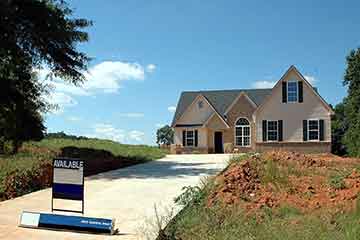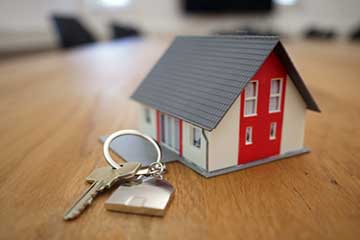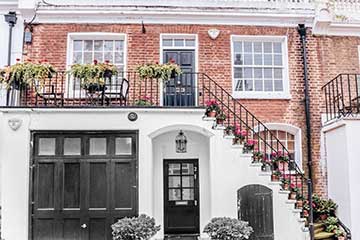What costs are involved in buying a house?
Our “What costs are involved in buying a house?” guide is the perfect starting point for learning about the true cost of buying your dream property, from deposits and mortgage costs to moving and surveying fees.
Wondering how much it costs to buy a house or a flat in England? There’s a list of fees to consider when buying a new house, including the cost of movers, taxes, insurance, your deposit, and solicitor fees.
It’s also important to note that without taking the mortgage deposit into consideration, which is usually between 5% to 20% of the purchase price, a mortgage package will come with additional setup costs mention as follow:
These additional fees can include a mortgage application fee, which covers the lender’s cost of processing your application and can range from £99 to £250.
There is also an arrangement fee, which covers the lender’s costs of setting up the mortgage and can range from £0 to £2,000. If you use a mortgage broker, you may have to pay an advisor fee, which can range from £0 to £1,000.
Additionally, if you want to repay your mortgage early, you may have to pay an early repayment charge, which can range from 0% to 5% of the outstanding mortgage balance.
Many buyers choose to add these fees into the loan itself, which can result in paying more in interest over time.
When a mortgage package is sold, a valuation fee is typically included. The lender will conduct a property valuation to ensure that the house you’re buying is worth the amount you’re planning to pay for it.
However, it’s important to keep in mind that sometimes this valuation fee is not included in the mortgage package, and you may be expected to cover these extra costs. The cost of the valuation fee can vary depending on the lender and the size of the property, ranging from £200 to £750.
It’s important to factor in all of these costs and consider them in your overall budget when planning to buy a house. Additionally, it’s always wise to consult with a financial advisor or mortgage broker to get a more accurate estimate of the costs and to make sure you are making the right decision for you and your finances.
This article will cover:
Valuation Fee
The majority of new buyers have the perception that the valuation covered within their mortgage package is all they need to give them an idea on their “to be home” condition. In most cases, the valuation report is not even shared with the buyer is just for the eyes of the lender.
And even if will be shared with the buyer, the evaluation does not cover any structural or in-depth inspection of the property.
As per the RICS report, 75% of homeowners bought a property without having a home survey first. These buyers then went on to spend on average £5,750 in unexpected repair work.
All of these can be avoided by having a chartered surveyor inspect your future home. The most common types of surveys are: HomeBuyer Report or a Building Survey and usually start from £450 depending on property size, location and complexity.
Usually a HomeBuyer Report is suitable for a property less than 50 years old, using traditional method of construction and with less than 4 bedrooms. For anything else, a Building Survey is recommended. To read more about the difference between these survey, use our “HomeBuyer Report Vs Building Survey” guide.
Need A Free Estimate?
- Fully qualified RICS professional surveyor
- Affordable, fast and thorough surveys
- Clear, precise and easy to understand report
Conveyancing fees
In order to buy a property, you will need to hire a licensed conveyancer or a property solicitor to handle the legal matters. Usually, this means that a series of fees are required to be paid by the buyer in exchange of the different services provided.
These are: legal searches, money transfer, ID verification, Land Registry inquiries and registration. Depending on property value the conveyancing fees will vary.
For example, for a £100,000 property, on average the conveyancing fees are £780 with VAT, while for a £500,000 property the fees will cost the buyer around £1,250 (Source: conveyancingcalculator.co.uk)
Stamp duty costs
Stamp duty is a tiered tax on property and land transactions and, similar to conveyancing fees, are depending on the property value and type. However, it will depend also if you are a first time buyer or not.
For a first-time buyer, the stamp duty will 0% for properties up to £300,000. 5% for properties between £300,001 – £500,000. On properties above £500,000 is no tax relief available.
For a home mover, you will pay stamp duty at the below rates, only if it is your own property. Usually, you will pay 3% on top of these rates if you own another residential property.
| Property value (or lease premium/transfer vlaue) | Stamp duty (SDLT) rate |
|---|---|
| Up to £125,000 | 0% |
The next £125,000 (£125,001 – £250,000) | 2% |
The next £675,000 (£250,001 – £925,000) | 5% |
The next £575,000 (925,001 – £1,500,000) | 10% |
The remaining amount (above £1,500,000) | 12% |
As example, for if you buy a house for £370,000, the Stamp Duty you owe will be:
0% on first £125,000 = £0
2% on next £125,000 = £2,500
5% on next £120,000 = £6,000
Total SDLT = £8,500 (Source: Gov.uk)
Surveyor's Fee
Before you buy a property, it is important to get it checked by a surveyor. This is vital so you understand if there are any problems before you buy. Surveys range from a basic home condition survey costing around £250 to a full structural survey from £600 or more. Paying for a good survey could save you money on repairs in the long run.
Electronic Transfer Fee
This usually costs £40-£50. It covers the lender’s cost of transferring the mortgage money from the lender to the solicitor.
Estate Agent’s fee
This is only paid by the seller, not the buyer, for the estate agent’s services. It is negotiated when they put the property on the market. It is usually 1% to 3% of the sale price plus 20% VAT, or a flat fee for online estate agents.
Need A Free Estimate?
- Fully qualified RICS professional surveyor
- Affordable, fast and thorough surveys
- Clear, precise and easy to understand report
When buying a house, it’s important to also consider the ongoing costs that come with home ownership. These include:
Mortgage repayments – This will depend on the type of mortgage you have, the interest rate, and the amount you borrow.
Home insurance – This will cover the cost of repairs or rebuilding your home if it’s damaged or destroyed.
Council Tax – This is a tax that you will have to pay to your local council. The amount will depend on the value of your property and your local council’s tax rate.
Repairs and maintenance – As a homeowner, you will be responsible for any repairs and maintenance needed for your property.
Utilities – You will have to pay for utilities such as electricity, gas, and water.
Leaseholders' Costs
If you’re buying a leasehold property, there will be additional costs to consider. These include:
Ground rent – This is a fee that you will have to pay to the landlord or freeholder.
Service charge – This is a fee that covers the cost of maintaining the common areas of the building or development.
Lease extension – If you’re planning to stay in your leasehold property for a long time, you may have to pay to extend the lease.
There are different ways you can own property: freehold, leasehold or through a share of the freehold. Read more on Leasehold vs Freehold.
When buying a new house, you’ll also need to consider the costs of moving. These include:
Removals costs – This covers the cost of hiring a removal company to move your belongings to your new home.
Storage costs – If you need to store your belongings before moving into your new home, you’ll have to pay for storage.
Redecorating costs – If you want to redecorate your new home, you’ll have to pay for paint, wallpaper, and other materials.
Cleaning costs – You’ll have to pay for cleaning your old and new home before and after moving.
By considering all these costs, you can have a clearer picture of the overall expenses of buying a house and moving in England. It’s important to budget for these additional expenses, so you can ensure that you have enough money to cover all costs involved.
Buying a house is a big financial commitment, and it’s important to be aware of all the costs involved. By understanding the costs of mortgages, valuations, surveys, legal fees, stamp duty, and moving expenses, you can make a more informed decision about how much house you can afford and budget accordingly.
Additionally, it’s important to consider the ongoing costs of home ownership such as insurance, council tax, repairs and maintenance, and utilities. Furthermore, if you are planning to buy a leasehold property, you should also take into consideration the leaseholders’ costs such as ground rent and service charge.
It’s also important to remember that these costs will vary depending on the property’s location, size and condition. Always consult with a financial advisor or a mortgage broker to get an accurate estimate of the costs and to help you decide whether it’s the right time for you to buy a house, and if you can afford it.
Written by Danil P.
29th Sep 2021 (Last updated on 24th Jan 2023)
8 minute read





